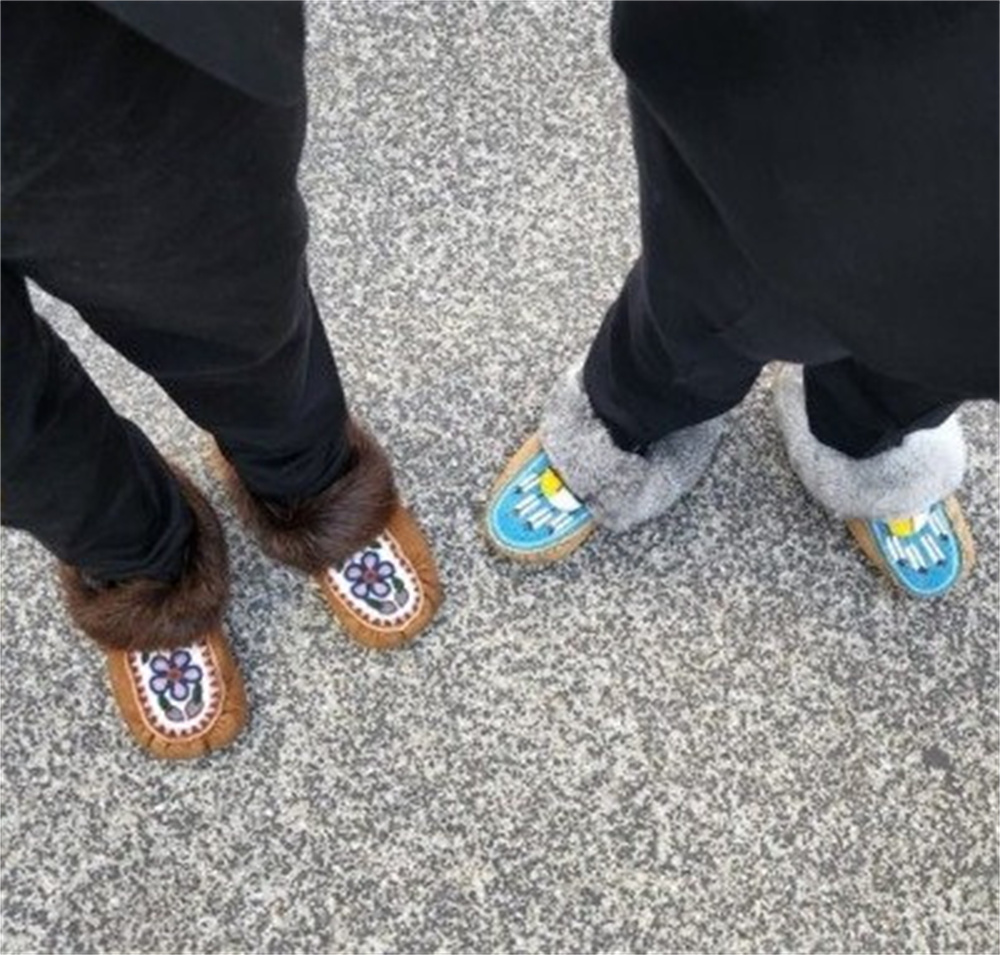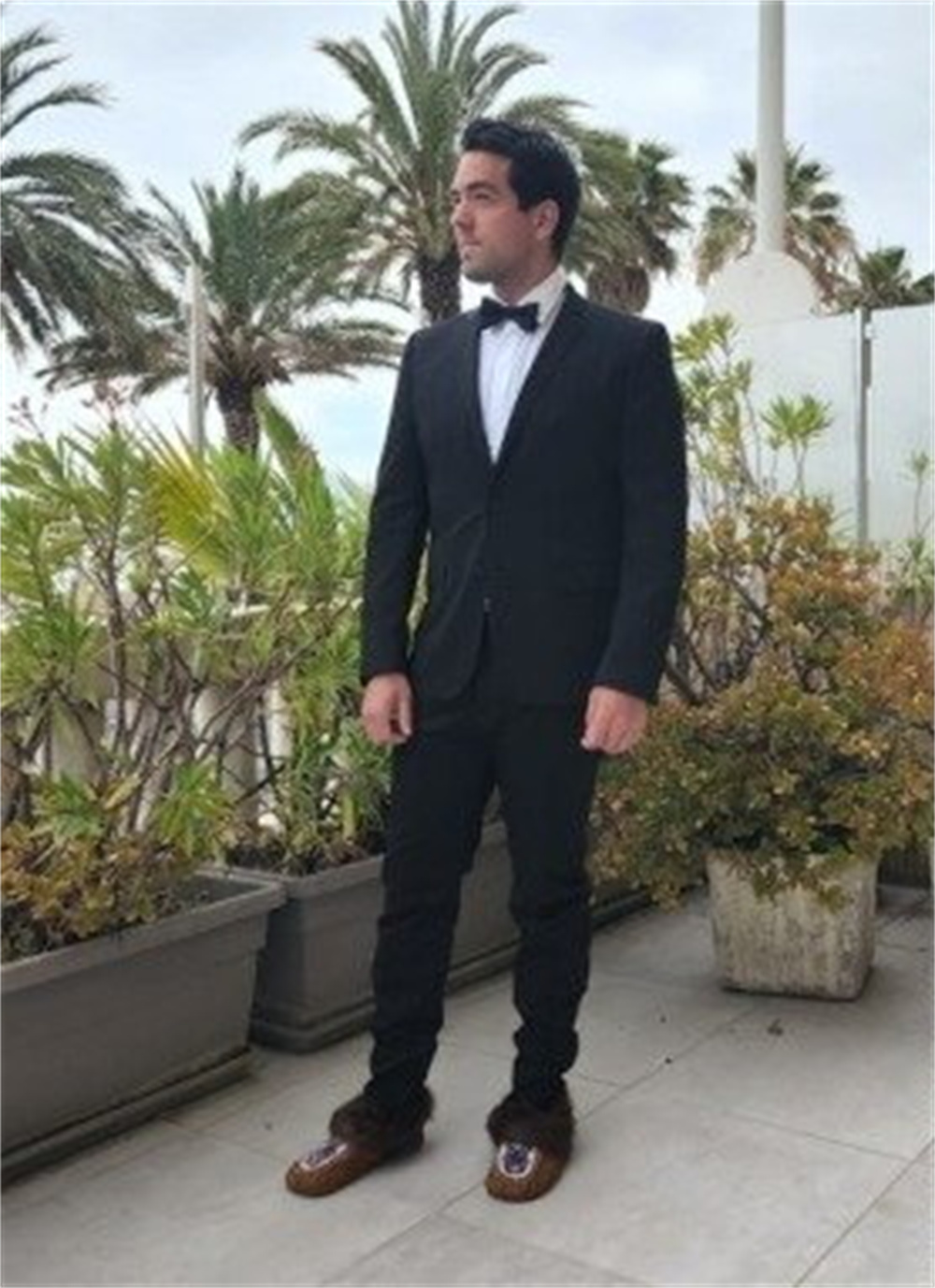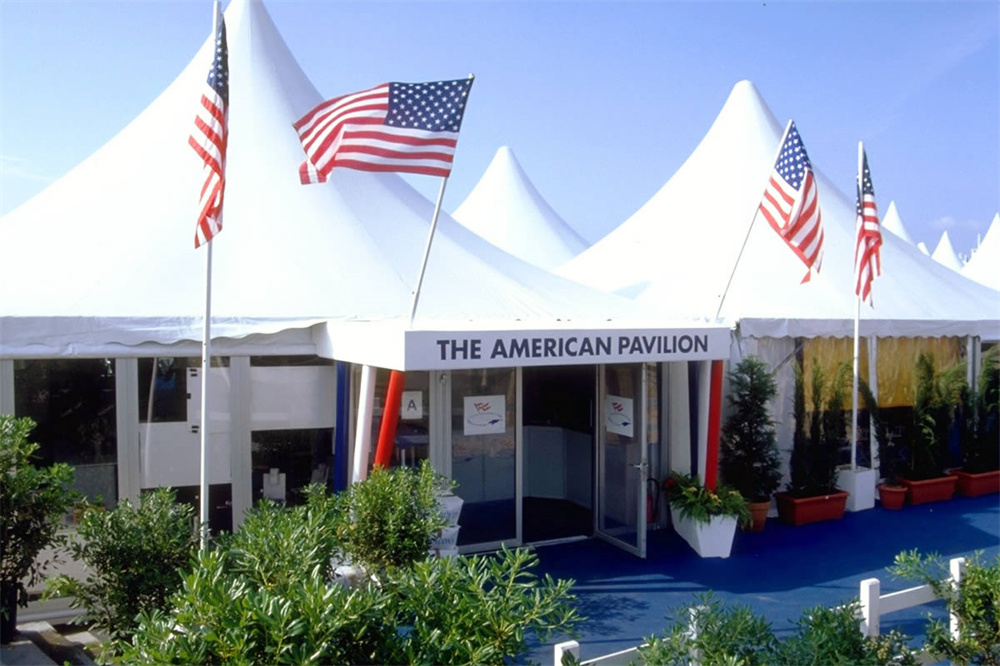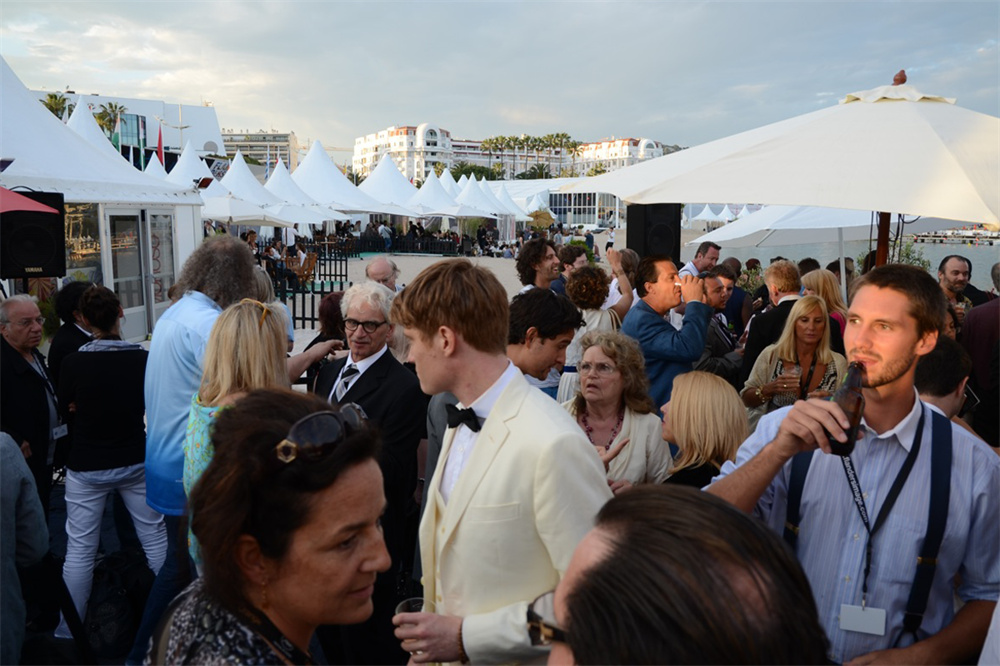The 75th Cannes Film Festival has entered the countdown to the closing. In addition to the various topics of the participating films, some negative news have also been exposed.
Indigenous Canadian dress is not considered 'formal'
According to the American entertainment news media Variety, film producer Kelvin Redvers (Kelvin Redvers) from Vancouver, Canada encountered an embarrassing incident in Cannes: as an aboriginal Dene, he Showing national pride and promoting local culture, when attending film and television exchange events around the world, he is accustomed to wearing some clothing accessories with ethnic characteristics. This time, he was invited to participate in the red carpet ceremony of the film "Les Amandiers" in Cannes. He was turned away by security because of the traditional Aboriginal moccasins he was wearing on his feet.
Against this background, this year, the Canadian Film Board sent a delegation composed entirely of Aboriginal filmmakers to the Cannes Film Festival to look for venture capital opportunities. It also hopes to use the world's largest exchange platform for film culture to showcase itself. unique cultural heritage. Therefore, when Kevin Redforce walked the red carpet this time, he deliberately put on beautiful moccasins that can represent the cultural characteristics of his family, but he was still wearing a black suit that met the Cannes dress code. "My sister made these shoes, and I was very excited to wear them on the red carpet at Cannes," he said regretfully.
The Cannes security team has always been known for its meticulous discipline, ranging from dress codes and cellphone selfies to food in bags. Once, there was an unwritten rule that women had to wear high heels to walk on the red carpet, and in 2015, negative news broke that female filmmakers were turned away by security for wearing flat shoes. In recent years, due to the vigorous rise of various women's rights movements, coupled with the fact that some female filmmakers are taking the lead in challenging stereotypes, Cannes has finally completely loosened its restrictions on what shoes women wear. But for men's clothing, black or dark blue formal dress requirements have remained unchanged for decades. Even journalists who take photos on the red carpet, Cannes always require them to wear black tuxedos. The purpose is naturally to maintain the so-called Cannes so-called Fashionable, charming, elegant and stylish brand image.
Perhaps this year's red carpet ceremony has seen a number of uninvited guests, and the security team has become more and more alert and does not relax. So, as soon as Kevin Redforce stepped on the red carpet, sharp-eyed security guards noticed the traditional moccasins he was wearing and asked him to leave immediately. Since then, his colleagues have repeatedly communicated with these security guards in French, and emphasized that Cannes has always been open to national-style clothing such as Indian sarees or kilts.
"There was a pretty tough security guard who stopped me right in front of me and said in English, 'You gotta get out of here. Get out now, get out now, get out!'" recalls Redforce. "I was really at a loss at that moment. Feeling sad again, feeling slighted. I just dressed up according to our national tradition and ended up being treated like a criminal by Cannes.”
Eventually, Redforce went back for a pair of leather shoes and re-entered the Almond Theater screening. The organizer of the Cannes Film Festival, which received a complaint from the Canadian Film Board, also appointed Secretary-General François de Rousseau and others to come to the door the next day to apologize. But after the apology, the Secretary-General still explained to Redforce that the rules are the rules. If he wears shoes like this next time, he may still be rejected from Cannes, because in Cannes' view, this pair of moccasins It just doesn't meet their definition of "formal".
After the premiere of the Canadian film "Future Crime", Redforce continued to wear his moccasins to the red carpet. "The first security guard I encountered noticed my shoes again and was about to come over and say something, and the other security guard next to him said something to him, and we were let out." Redford "But that doesn't mean all of our goals have been achieved, what we hope is that they can recognize that moccasins or a ribbon dress, in their eyes, may not think it's a formal dress, but in others In our culture, this is the very solemn formal attire that our aboriginal people wear when they attend major ceremonies."
U.S. booth borrows intern positions to make money
According to the American film media "The Wrap" (The Wrap), a number of interns who served at the U.S. booth of the Cannes Film Festival also encountered multiple troubles this year, including free labor and workplace harassment. Readers who are familiar with the Cannes Film Festival may notice that in addition to the major cinema halls, the long row of white tents along the coastline is also a lively place with people during the film festival every year. Official or non-governmental organizations from many countries will organize their own national booths here to promote their own films, and also provide a site for communication, information collection and relaxation for guests from all walks of life.
If there is a booth, there must be service personnel. Most of the national booths will choose to hire locally or dispatched domestically, and these service personnel can also get a good salary. It is said that only the 33-year-old booth in the United States has adopted the "student project" recruitment method in an ingenious way. Not only does it not need to pay fees to service personnel, but it can also earn a large amount of registration fees.
"Want to gain first-hand working experience at the world's most important film festival? Want to know what's behind the curtain at the world's most glamorous international film festival? Want to see films from around the world? Want to gain relevant experience in the film industry, entertainment industry, or large-scale event organization? Our Cannes Film Festival student program is just for you! It's more than just an intern."
However, when they got to the scene, many of them discovered that the truth was not so good at all. The first person to pay attention to their plight was Stephen Follows, an American film scholar and independent screenwriter. After visiting more than 30 service personnel at the Cannes booth in the United States, he found that although a few people said that they had indeed learned a lot during the so-called internship, more people still complained that the effort was disproportionate to the gain, and they felt deceived.
Second, even if they do get a chance to talk, these young students frequently encounter unpleasant experiences such as sexual harassment, abuse, and bullying. Behind the glamorous appearance of Cannes, not everyone is a modest gentleman, especially in front of these students who are only newcomers to the society at first glance, many booth members rely on their industry status to make various inappropriate actions. , which made these interns in foreign countries complain, and the booth did not give them enough support and protection, which made them feel even more chilled.
Stephen Foulos recorded the voices, blood and tears of these young people in detail on his personal blog. After media reports such as "Finishing the Youth", it also attracted an official response from the US booth, but the various excuses basically just emphasized that he obeyed all his actions. US and French laws. They did not deny the model of paid internships, nor did they see anything wrong with it.
In fact, according to the scale of 223 interns this year, the US booth will earn nearly one million dollars from the registration fee alone. For guests who want to enter the booth and get the services of these interns, they also need to pay a membership fee of $275 to become a standard member of the US booth. In other words, the shrewd American booth is doing a good business that makes money at both ends, making sure no losses. It is understood that among the major national booths in Cannes, the only one that charges the admission fee to the guests is actually the only American booth.
Earlier this year, Penske Media announced that it had bought the operating rights of the Cannes pavilion in order to expand its influence at the Cannes Film Festival. Founded in 2003, Penske Media currently owns four websites including The Hollywood Reporter magazine and website, Variety magazine and website, Deadline and IndieWIRE. A powerful Hollywood media outlet, and perhaps that explains why news of the ruthless exploitation of these interns hasn't appeared in any of these media outlets for the time being.
Indigenous Canadian dress is not considered 'formal'
According to the American entertainment news media Variety, film producer Kelvin Redvers (Kelvin Redvers) from Vancouver, Canada encountered an embarrassing incident in Cannes: as an aboriginal Dene, he Showing national pride and promoting local culture, when attending film and television exchange events around the world, he is accustomed to wearing some clothing accessories with ethnic characteristics. This time, he was invited to participate in the red carpet ceremony of the film "Les Amandiers" in Cannes. He was turned away by security because of the traditional Aboriginal moccasins he was wearing on his feet.

Canadian Aboriginal traditional moccasins, considered informal on the Cannes red carpet.
Aboriginal Canadians, who make up about 4% of its population, were the earliest inhabitants of that land. At the end of the fifteenth century and the beginning of the sixteenth century, European colonists came to settle in the area one after another. On the one hand, they brought various infectious diseases, which directly led to a sharp decline in the population of the aborigines; on the other hand, they imposed various assimilation policies at the end of the eighteenth century. , to change the religious beliefs, living habits and even the language of the indigenous people. With the rise of aboriginal rights activities around the world, the Canadian government has also begun to pay attention to the livelihood rights of these indigenous peoples. The shady history of the murder of aboriginal children in church boarding schools, which have been unveiled since last year, has also drawn the world's attention to the interests of this part of Canada's aboriginal people.Against this background, this year, the Canadian Film Board sent a delegation composed entirely of Aboriginal filmmakers to the Cannes Film Festival to look for venture capital opportunities. It also hopes to use the world's largest exchange platform for film culture to showcase itself. unique cultural heritage. Therefore, when Kevin Redforce walked the red carpet this time, he deliberately put on beautiful moccasins that can represent the cultural characteristics of his family, but he was still wearing a black suit that met the Cannes dress code. "My sister made these shoes, and I was very excited to wear them on the red carpet at Cannes," he said regretfully.
The Cannes security team has always been known for its meticulous discipline, ranging from dress codes and cellphone selfies to food in bags. Once, there was an unwritten rule that women had to wear high heels to walk on the red carpet, and in 2015, negative news broke that female filmmakers were turned away by security for wearing flat shoes. In recent years, due to the vigorous rise of various women's rights movements, coupled with the fact that some female filmmakers are taking the lead in challenging stereotypes, Cannes has finally completely loosened its restrictions on what shoes women wear. But for men's clothing, black or dark blue formal dress requirements have remained unchanged for decades. Even journalists who take photos on the red carpet, Cannes always require them to wear black tuxedos. The purpose is naturally to maintain the so-called Cannes so-called Fashionable, charming, elegant and stylish brand image.
Perhaps this year's red carpet ceremony has seen a number of uninvited guests, and the security team has become more and more alert and does not relax. So, as soon as Kevin Redforce stepped on the red carpet, sharp-eyed security guards noticed the traditional moccasins he was wearing and asked him to leave immediately. Since then, his colleagues have repeatedly communicated with these security guards in French, and emphasized that Cannes has always been open to national-style clothing such as Indian sarees or kilts.
"There was a pretty tough security guard who stopped me right in front of me and said in English, 'You gotta get out of here. Get out now, get out now, get out!'" recalls Redforce. "I was really at a loss at that moment. Feeling sad again, feeling slighted. I just dressed up according to our national tradition and ended up being treated like a criminal by Cannes.”
Eventually, Redforce went back for a pair of leather shoes and re-entered the Almond Theater screening. The organizer of the Cannes Film Festival, which received a complaint from the Canadian Film Board, also appointed Secretary-General François de Rousseau and others to come to the door the next day to apologize. But after the apology, the Secretary-General still explained to Redforce that the rules are the rules. If he wears shoes like this next time, he may still be rejected from Cannes, because in Cannes' view, this pair of moccasins It just doesn't meet their definition of "formal".

Kevin Redforce in Canadian Aboriginal traditional moccasins.
"This is really ridiculous." Redforce told reporters, "For me, these are part of formal wear. What Cannes does is to predetermine a fixed word for formal wear. It's framed, and it's exactly what a typical Westerner would define as formal wear."After the premiere of the Canadian film "Future Crime", Redforce continued to wear his moccasins to the red carpet. "The first security guard I encountered noticed my shoes again and was about to come over and say something, and the other security guard next to him said something to him, and we were let out." Redford "But that doesn't mean all of our goals have been achieved, what we hope is that they can recognize that moccasins or a ribbon dress, in their eyes, may not think it's a formal dress, but in others In our culture, this is the very solemn formal attire that our aboriginal people wear when they attend major ceremonies."
U.S. booth borrows intern positions to make money
According to the American film media "The Wrap" (The Wrap), a number of interns who served at the U.S. booth of the Cannes Film Festival also encountered multiple troubles this year, including free labor and workplace harassment. Readers who are familiar with the Cannes Film Festival may notice that in addition to the major cinema halls, the long row of white tents along the coastline is also a lively place with people during the film festival every year. Official or non-governmental organizations from many countries will organize their own national booths here to promote their own films, and also provide a site for communication, information collection and relaxation for guests from all walks of life.
If there is a booth, there must be service personnel. Most of the national booths will choose to hire locally or dispatched domestically, and these service personnel can also get a good salary. It is said that only the 33-year-old booth in the United States has adopted the "student project" recruitment method in an ingenious way. Not only does it not need to pay fees to service personnel, but it can also earn a large amount of registration fees.
"Want to gain first-hand working experience at the world's most important film festival? Want to know what's behind the curtain at the world's most glamorous international film festival? Want to see films from around the world? Want to gain relevant experience in the film industry, entertainment industry, or large-scale event organization? Our Cannes Film Festival student program is just for you! It's more than just an intern."

U.S. booth at Cannes Film Festival
With the attractive slogan on the official website, the US booth can attract about 200 students between the ages of 17 and 20 to sign up for this internship every year. It is said that it is an internship. In fact, the students have to pay the organizer an activity fee of 4,000 US dollars. This fee only includes the transportation fee from Nice Airport to Cannes and the local collective accommodation fee in Cannes, the rest of the United States to France The cost of air tickets and daily The cost of meals, equipment and daily expenses are all borne by the students themselves. Nevertheless, in order to get a first-hand experience in Cannes, longing to meet big-name filmmakers from all over the world at the US booth, and maybe bump into some noble people, young Americans who sign up for this internship program every year are still coming. Incessantly.However, when they got to the scene, many of them discovered that the truth was not so good at all. The first person to pay attention to their plight was Stephen Follows, an American film scholar and independent screenwriter. After visiting more than 30 service personnel at the Cannes booth in the United States, he found that although a few people said that they had indeed learned a lot during the so-called internship, more people still complained that the effort was disproportionate to the gain, and they felt deceived.

The various services of the Cannes USA booth are provided by interns.
The first is free labor. The booth is open from 9:00 to 6:00 every day, providing various paid meals and beverages to registered members who come to rest at any time, and is responsible for serving them meals and cleaning up afterward. It is all the work of these interns. Not getting paid a penny. According to the official statement of the booth, the remuneration they provide to these young people is the opportunity to meet people in the industry, but in practice, these young people who are busy serving food and wine have very few opportunities to have a substantive dialogue with the guests. The so-called network expansion is nothing but wishful thinking.Second, even if they do get a chance to talk, these young students frequently encounter unpleasant experiences such as sexual harassment, abuse, and bullying. Behind the glamorous appearance of Cannes, not everyone is a modest gentleman, especially in front of these students who are only newcomers to the society at first glance, many booth members rely on their industry status to make various inappropriate actions. , which made these interns in foreign countries complain, and the booth did not give them enough support and protection, which made them feel even more chilled.
Stephen Foulos recorded the voices, blood and tears of these young people in detail on his personal blog. After media reports such as "Finishing the Youth", it also attracted an official response from the US booth, but the various excuses basically just emphasized that he obeyed all his actions. US and French laws. They did not deny the model of paid internships, nor did they see anything wrong with it.
In fact, according to the scale of 223 interns this year, the US booth will earn nearly one million dollars from the registration fee alone. For guests who want to enter the booth and get the services of these interns, they also need to pay a membership fee of $275 to become a standard member of the US booth. In other words, the shrewd American booth is doing a good business that makes money at both ends, making sure no losses. It is understood that among the major national booths in Cannes, the only one that charges the admission fee to the guests is actually the only American booth.
Earlier this year, Penske Media announced that it had bought the operating rights of the Cannes pavilion in order to expand its influence at the Cannes Film Festival. Founded in 2003, Penske Media currently owns four websites including The Hollywood Reporter magazine and website, Variety magazine and website, Deadline and IndieWIRE. A powerful Hollywood media outlet, and perhaps that explains why news of the ruthless exploitation of these interns hasn't appeared in any of these media outlets for the time being.










Comments